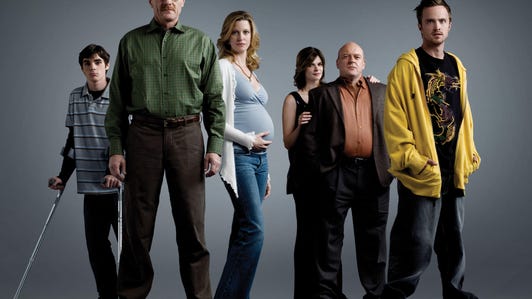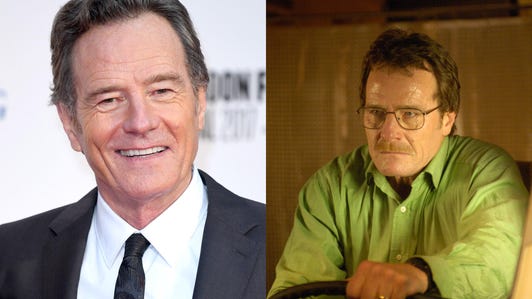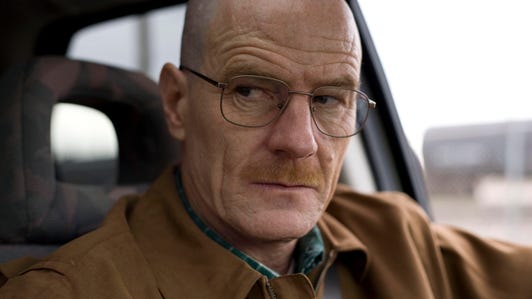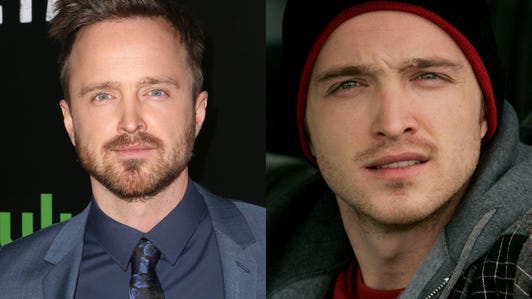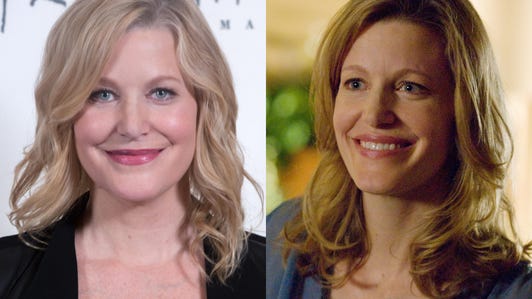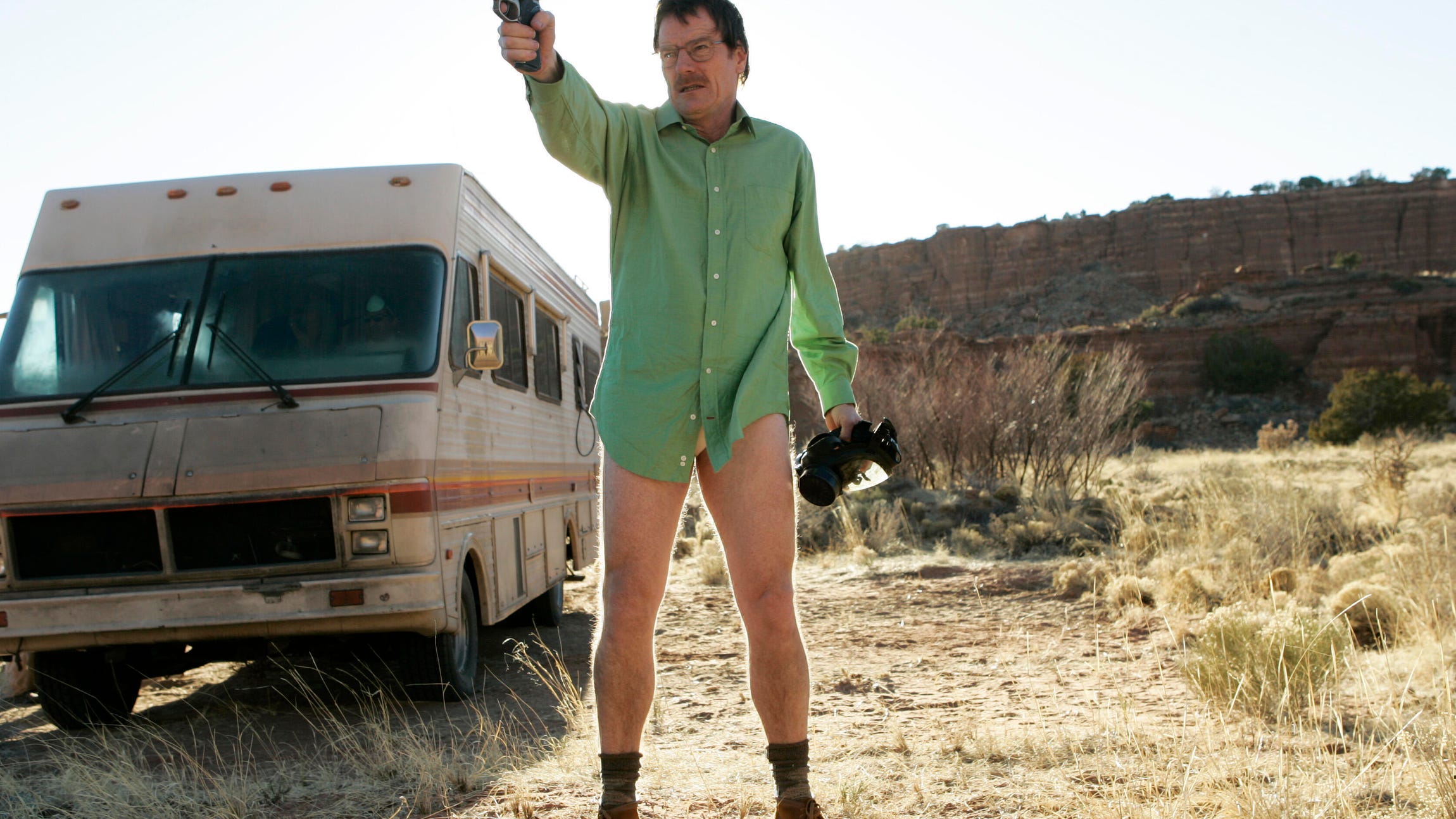
'Breaking Bad' Turns 10: An Oral History of the Pilot
A behind-the-scenes look at how "a series of mishaps" turned into an iconic, award-winning show.
When AMC's Breaking Badwas being developed, it had all the cards stacked against it. As one executive put it in a preproduction phone call, "We're making a series about a guy who sells crystal meth. We'll all be lucky to still have our jobs when this is over."
"It was just fortuitous happenstance a lot of the time that got us through," creator Vince Gilligan insists of his multiple Emmy and Peabody award-winning show. "I just feel like there was an awful lot of luck involved, a lot of good timing."
Still, that might be selling it short just a tad. It's true that the launch of Breaking Bad was plagued by mishaps that turned into blessings, and in a lot of instances, those "Plan B"s allowed the show to morph into the iconic series it became. But there was more than a fair amount of talent and creative vision at play as well. The story of Breaking Bad is a story about a group of people having faith in a project they believed in on an artistic level, while realizing they were trying to do something that had never been done on television before.
Ten years later, these are recollections from the cast, crew and producers, in their own words, of what it was like to make the pilot from start to finish, and all the many bumps along the way.
(Aaron Paul and Anna Gunn declined to participate in this oral history.)
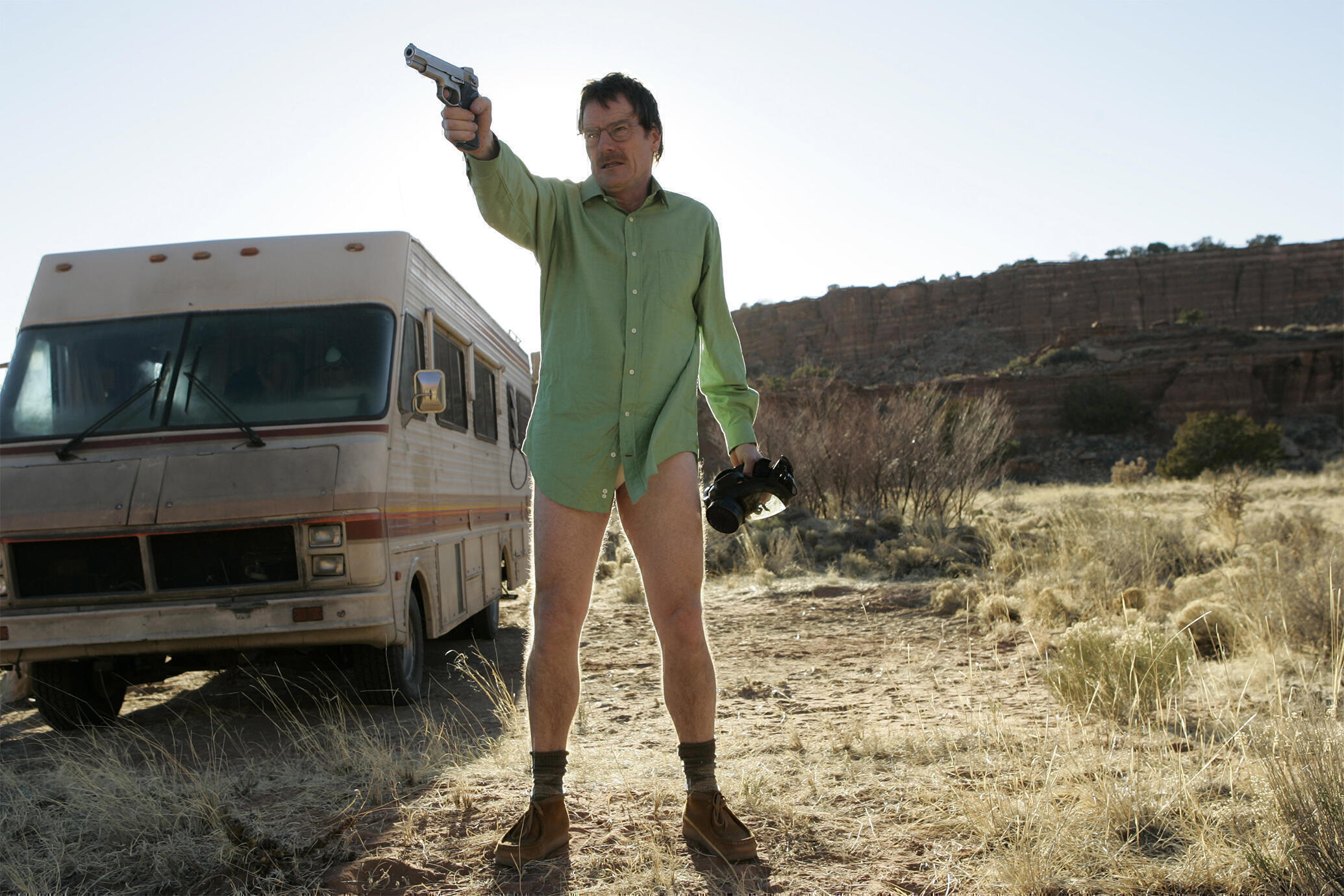
At the end of 2006, with the Mad Men pilot in hand and set to premiere the following summer, AMC executives were looking for their next scripted series.
Christina Wayne (former SVP of scripted programming, AMC): We didn't want to do a period drama like Mad Men. We wanted something completely different.
Vlad Wolynetz, (former VP of production, series and movies, AMC): We had a thing about making the shows that no one else would dare make at that point. [Rob Sorcher, AMC's then-EVP of programming and production] had a very specific thing about what we should and shouldn't be doing. His point of view was, we had to run as far away from a period show, or a Western, or anything like that, and do the most intrinsically unexpected thing that we could find. [The Breaking Bad] script hit everybody the same way. ... It's so brilliant, and completely the opposite of what anybody could see coming.
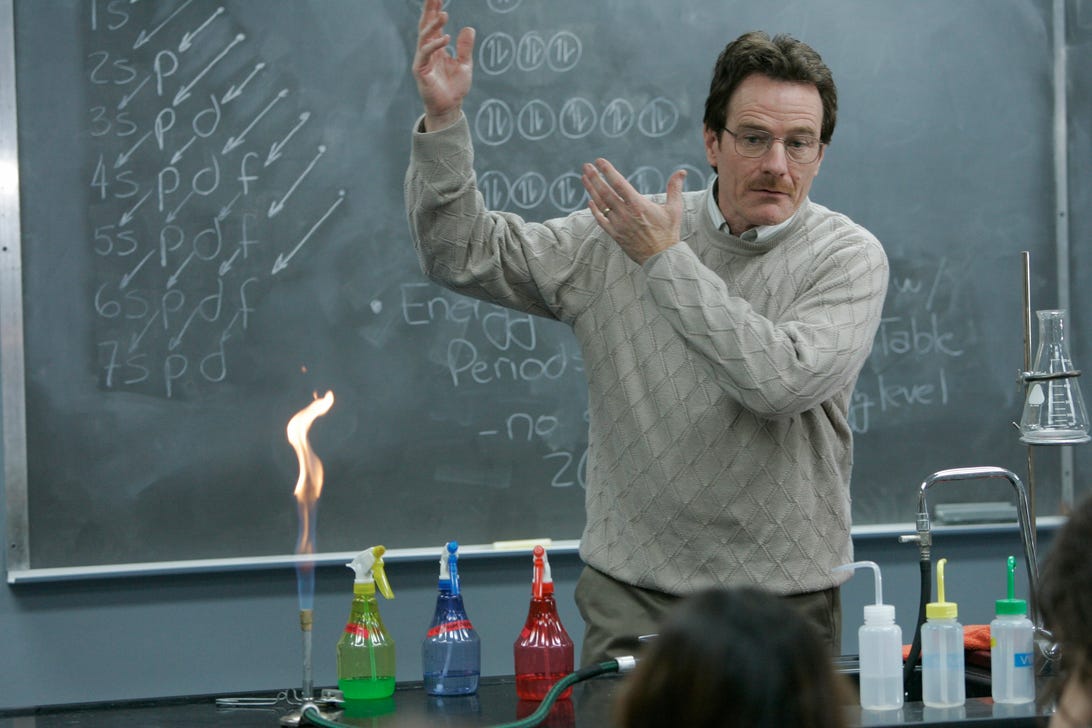
Bryan Cranston, Breaking Bad
Doug HyunJeremy Elice, a former FX employee who was now working under Wayne at AMC, drew his boss' attention to a script by a former X-Files writer named Vince Gilligan that several networks, including FX, had passed on. Most of the nos were due to the project's overall plot: After being diagnosed with terminal lung cancer, a high school chemistry teacher turns to cooking crystal meth in order to leave some money behind for his family.
Vince Gilligan (creator/writer/director): What inspired the pilot was a certain amount of desperation on my part. I had been without work for a couple of years when the idea for the pilot hit me. I was about to turn 40 years old, and I was thinking a lot about midlife crises, and was about to embark upon one myself. ... Of course, Walter White is having the world's worst midlife crisis, which in fact turns out to be an end-of-life crisis.
Stew Lyons (unit production manager): It didn't sound very likely to be a success. It had no eye candy. It was kind of a depressing story about a drug that has absolutely no redeeming qualities whatsoever. And it was a dark tale. That's what I thought when it was first pitched to me. And then of course you read the pilot and you begin to see that this is something very, very special.
Wayne: It was a page-turner. It was one of those scripts that you're like, "Oh my god, this is great writing, this is entertaining." This is exactly the type of thing we were looking for.
Gilligan: A lot of places, we never even bothered pitching to because we figured the big three networks were never going to buy a show about a guy cooking crystal meth. Certainly not circa 2004, 2005. One great meeting -- which was almost as good as the AMC meeting, even though it was a no -- was with TNT. ... They said, "We really love this, but at this point in time, if we buy this, we'll be fired."
Wayne: We recommended it to Rob Sorcher, who was running the channel, and Rob let it sit on his desk for weeks. Honestly, we bugged him to the point where he was yelling at us to stop bugging him about it. And it was infuriating, because we were like, "We have our next show!" ... Finally, we have our weekly meeting with him weeks later and he said, "Oh, I read that script last night. It's so great!"
Charlie Collier (president, AMC): Rob Sorcher handed it to me and said, "Read this. It's like nothing else we've read." And it really turned out to be very much the kind of bet we were looking to make next.
I had adjusted to the reality that this was never going to see the light of day.
AMC executives met with Gilligan -- who had basically given up hope on the pilot actually being made, but had also mapped out a rough arc for the entire series -- at the bar of the L'Ermitage Hotel in Beverly Hills.
Gilligan: This thing had been passed on by pretty much everybody in town when AMC came calling. I had had my heart broken and had adjusted already to the reality that this thing was never going to see the light of day. ... But I thought, at the very least, I'm going to get a $14 scotch out of this.
Wayne: Vince wasn't taking us very seriously. ... I think he was just kind of pitching it and not really caring what happened. I remember that he had pitched us in that meeting, "This is a man who goes from milquetoast to Scarface."
Gilligan: I thought, oh, that was a perfectly pleasant meeting and they say they liked the script. That's great. Bully for me. Whatever. But the damn thing's never going to happen. ... But lo and behold, they were serious about making it.
AMC greenlit the pilot and partnered with Sony to produce it. Gilligan would direct and Oscar-winning cinematographer John Toll was hired as DP.
Gilligan: I'd love to say I was proactive enough to ask [to direct the pilot], but I really didn't think it was a possibility. ... It's kind of unheard of for a writer -- for anyone, really -- who's not had plenty of television directing experience to get to direct a pilot.
Wolynetz: At one point, Christina suggested that Vince direct it.
Wayne: I blindsided everybody in a meeting and said that. Vlad and I went back to Rob and... he probably thought I was nuts, but went along with it.
Gilligan: I feel like I robbed a bank or something. To this day, I can't imagine why AMC and Sony let me direct this thing, but god bless 'em for it.
Karen Moore (line producer): [My agent] said, "Oh, the script is written by our client Vince Gilligan, and he's also going to direct it." I said, "Great. What else has he directed?" And there was this long pause and they went, "Ummm, an episode, maybe two episodes of X-Files."
Wayne: We were like, if John Toll's going to be the DP, who cares who the director is? Not literally, but... we knew it was going to look fabulous, and that it was going to be a very high-level production.
Wolynetz: Only a group as naïve and nuts as we were would have let that happen. [Laughs]
Wayne: Vince just had a very strong sense of how he wanted this show, and that came through when he was talking to us about it. ... Why stop a person with a real vision from doing that?
Wolynetz: He directed the sh-- out of it.
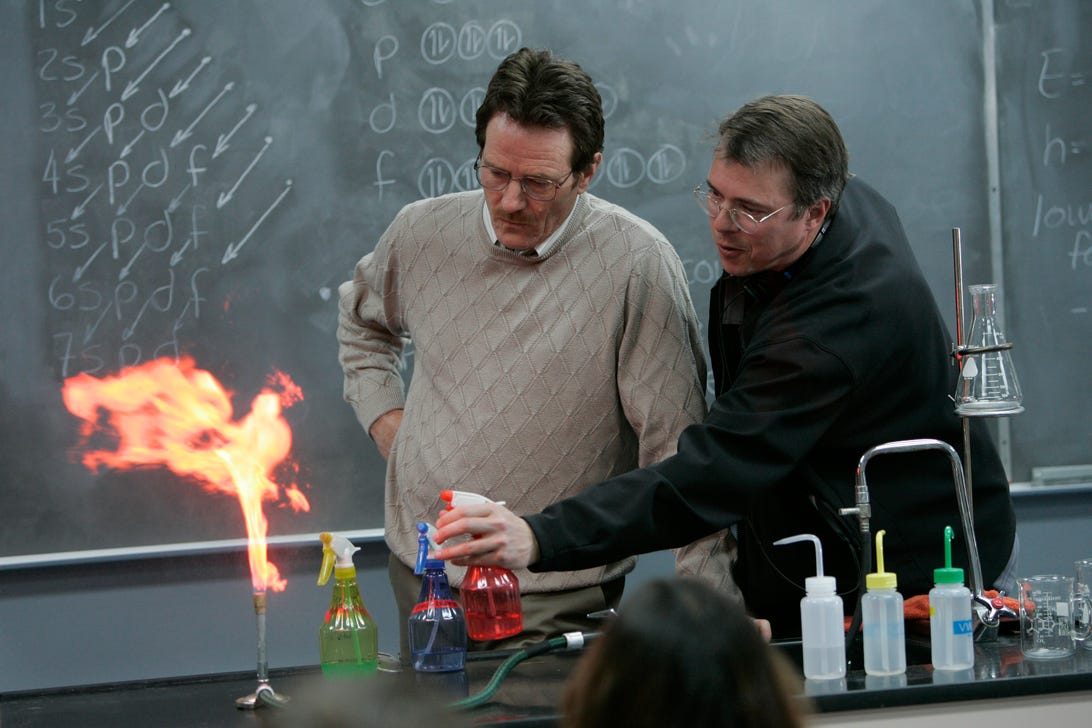
The casting process began in December 2006 and carried into the new year. For the main character, Walter White, Gilligan had in mind Bryan Cranston, an actor he had previously worked with on The X-Files who had gone on to star on the Fox comedy Malcolm in the Middle. Unfortunately, while Gilligan was clear on his top choice, AMC and the studio executives were more skeptical. And Cranston took some convincing as well.
Sharon Bialy (casting director): About two weeks before we went in to meet with Vince, Bryan had come in to audition for Aaron Sorkin's new play, The Farnsworth Invention. So we got to see a completely other side of Bryan Cranston... and we were sort of blown away by the depth of his talent. When we went to meet with Vince we said, "You're going to think we're crazy, but you should consider Bryan Cranston." Vince was already considering Bryan Cranston.
Gilligan: I wanted Bryan Cranston pretty much from the time I started actually typing the script. ... I just knew, this guy is the guy.
Bryan Cranston (Walter White): I got a call from my agent, and she said, "Do you remember Vince Gilligan?" And I said, "No."
Gilligan: When it came time to start kicking ideas around for casting and I mentioned [Bryan] to the AMC folks, they were a bit confused, and I don't blame them in hindsight. Because 99 percent of people who knew of Bryan Cranston the actor in 2006 knew him from Malcolm in the Middle as Hal, the lovable, goofy dad on that show.
Wayne: I was like, are you kidding? There are great actors out there.
With Breaking Bad, Vince Gilligan Created a New Kind of Antihero
Cranston: I don't blame Sony TV or AMC... That's a huge leap, to go from Hal to Walt.
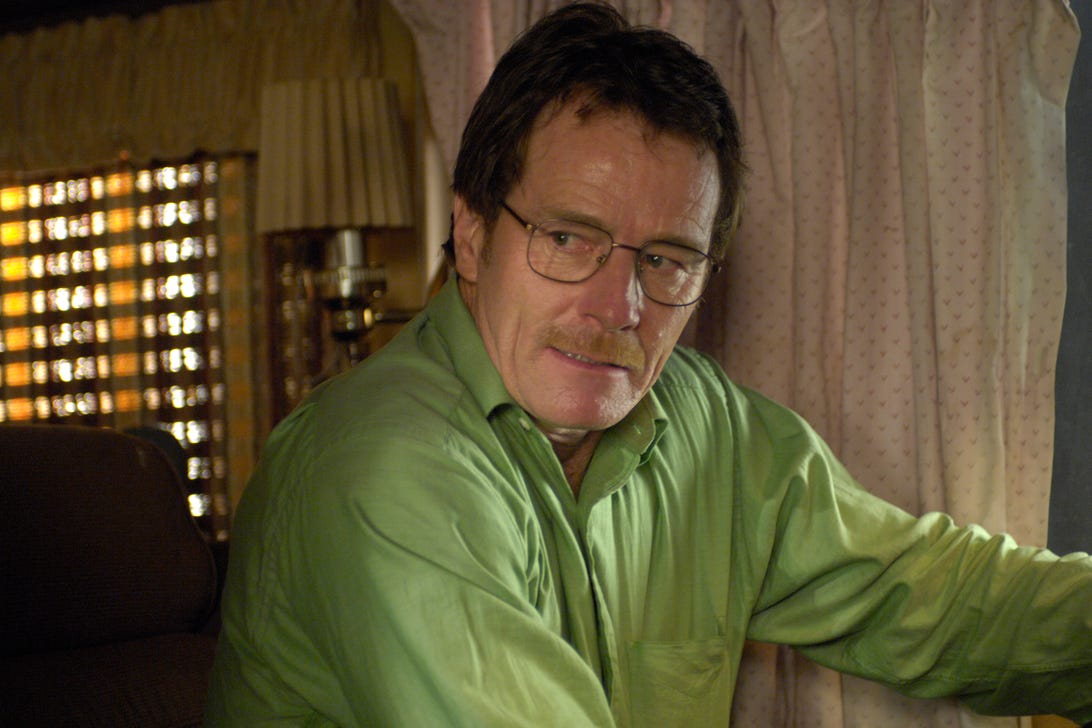
Bryan Cranston, Breaking Bad
Lewis Jacobs / AMRounding out the other principal players were Aaron Paul as Walter's former student turned meth-cooking partner, Jesse Pinkman; Anna Gunn as Walter's wife, Skyler; Betsy Brandt as Skyler's sister, Marie Schrader; and Dean Norris as Marie's husband, DEA agent Hank Schrader. Read more of the cast's audition stories here.
Dean Norris (Hank Schrader): It was truly the best script I'd ever read.
Betsy Brandt (Marie Schrader): It was the character, but also aside from that, it was the project. I just really wanted to be a part of that project. ... Not even knowing what it was going to be, but just meeting Vince and reading the script I was like, "This is something [I've got] to do. Even if it doesn't go anywhere."
Gilligan: Every single one of them, when they came in to audition for us, just basically had me at hello. To this day, I can't imagine a better group of actors to work with. I can't imagine a group of actors more suited to the roles that they played.
Moore: All of these actors who came in to read for us totally got that they had just read a remarkable script, and it was not your usual run-of-the-mill pilot script.
Gilligan: [Christina Wayne] thought that Aaron Paul was too handsome to play this skeevy young drug dealer... I said to her, "But he's really, really good, isn't he?" And she said, "Oh yeah, he's a great actor." I said, "Well, then what's the harm in there being a little eye candy on this thing?" [Laughs]
Wayne: Anna Gunn, she was an immediate yes.
Bialy: I had a broken foot, and I remember I had all the actors who were testing at the pilot sign my cast. I wish I would have kept it, but I was so happy to get that cast off that I threw it out... and everybody's autograph.
The last role to be cast was that of Walter's son Walter, Jr., who suffers from cerebral palsy. It went to 13-year-old RJ Mitte and was the role Gilligan knew he needed to get right not just for the show, but for the CP community.
Gilligan: It was important to me to, if at all possible, hire someone who actually did have CP to play the part of someone with CP.
RJ Mitte (Walter White Jr.): It's so important to have accurate representation of people with disabilities on television. ... With Breaking Bad, it was organic, and it was something that was just part of the family and natural, not contrived or exploitative, not, the disabled character's just there to get the ratings. That was something that [was rare] in the industry at that time, because... disability was just part of the story.
Bialy: One of the things Vince was looking for is someone perhaps with a little more severe cerebral palsy than RJ has. But, RJ had spent 10 years, 12 years of his life in therapy, working so hard to overcome or compensate for the disability. So, you don't want to penalize someone who's worked so hard to be able to speak more clearly or walk without crutches.
Mitte: [Walter Jr.] is actually based on a real person, a friend of Vince's... My character's actually in remembrance of him.
Gilligan: There was a young man I went to NYU with... and he presented as having really profound CP. He was the greatest guy... just this really courageous guy who became everybody's friend. We all loved him. And he passed away in his 20s, not too many years after college. Passed away in his sleep. I was thinking of him and his family and all the things they must have gone through and that he went through.
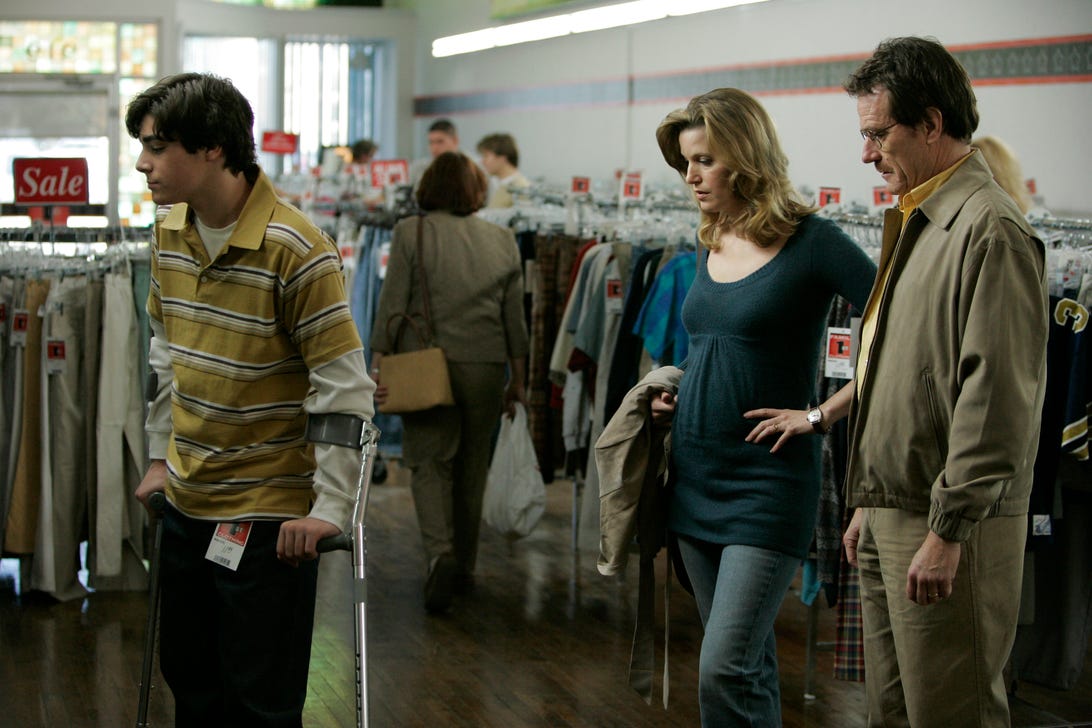
Gilligan had originally intended the story to take place in Riverside, California, where a DEA agent he was friends with in real life was based. But the setting of the show was changed to Albuquerque for budgetary reasons, thanks in part to a tax credit that was offered in New Mexico.
Moore: It was really the only place we could afford to make the pilot. I'm like ... Albuquerque? Seriously?
Lyons: We got amazing cooperation from Albuquerque. The film commissioner here, Ann Lerner, was really important [in] that [process]. The mayor embraced it at the time.
Brandt: It would have been a different show [in California]. That was the first of many moves where budget constraints really ended up working out for us.
Gilligan: When I was plotting out that first episode, I set it in Inland Empire, in the Riverside area of Southern California... because I had visited the real guys doing the job out there. ... Also, I liked the idea of being able to sleep in my own bed at night.
Moore: I agreed that I would fly in to Albuquerque to take a look. So, I flew in. It was bitterly cold ... A location scout that I had contacted took me out to this red rock area in this little [Native American] town called To'hajiilee. And I was like, "Oh my god. This is incredible." So, I go back to the hotel, I call Vince and I said, "This place is fantastic."
Gilligan: The production guys at Sony came to me and said, "What do you think about shooting the show in New Mexico?" I said, "Why would you do that? It's set for Riverside."
Moore: I had a long talk with Vince. I said, "Look, let's get you on a plane. We'll go back out together and you'll meet some of the people who are there, in terms of crew, etc. You'll get a lay of the land." ... Vince didn't make a fuss. He got on the plane. And he quickly realized that one scotch is the equivalent of two at this altitude, the first night here.
Gilligan: I'm very proud of the fact that I very quickly said yes. I wasn't overly rigid in my thinking in terms of, it's got to be this or nothing for artistic reasons. Because it dawned on me that, unfortunately, there's a meth problem in every state of the union, and I figured, yeah, why not? We'll set it here. One state's as good as the other. Of course, the truth is, [New Mexico] is far better than any other state could have been for Breaking Bad, because it allowed our show to become... a contemporary Western, which is not what I was thinking at the time.
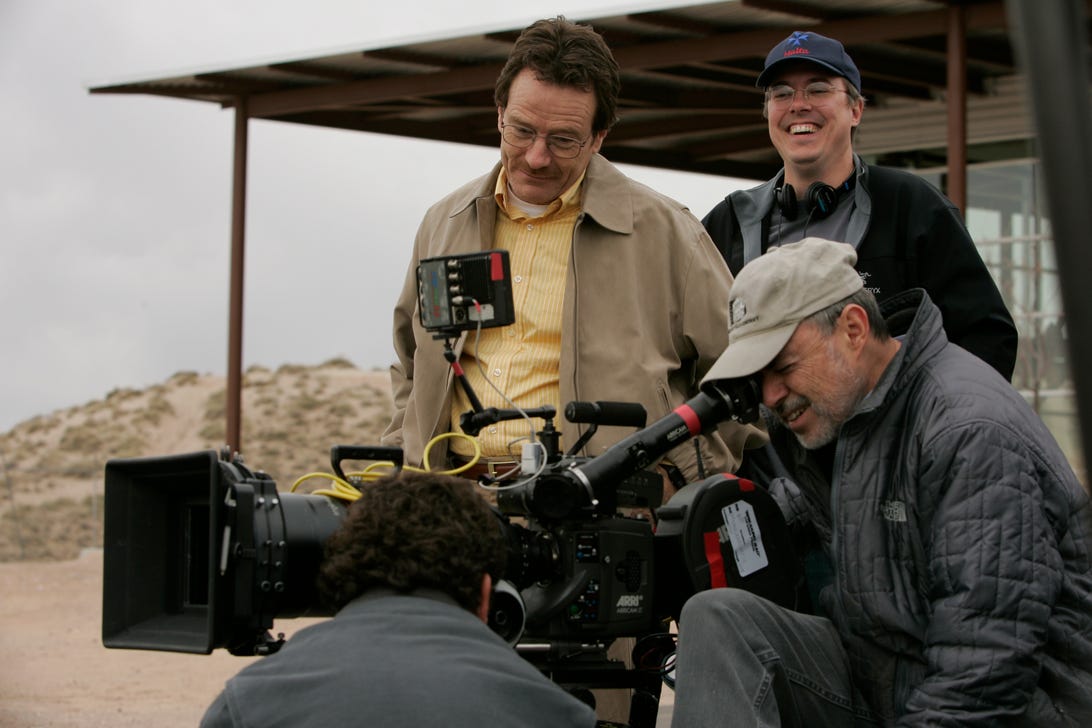
Bryan Cranston and Vince Gilligan on the set of Breaking Bad
Doug Hyun/AMCMoore: I said to him, "You know, if we're going to do this, you need to think about embracing Albuquerque like Albuquerque." In other words, not making Albuquerque look like L.A. Because that's never going to really happen.
Gilligan: The look of Albuquerque, with the amazing endless skies with the big, puffy cumulus clouds and the Sandia Mountains to the east, just the geography of the area, the landscape was so cinematic that it actually changed my thinking and changed the way we shot the show.
Lyons: He completely embraced Albuquerque and New Mexico. It certainly wasn't the most important decision, but it was a key, critical creative decision that just really made the show stand out as something that people had not seen before. Because we weren't shooting in the usual places. And the visuals in New Mexico -- the light, the way the soil looked, everything just made it something different.
Collier: The color palette of Albuquerque was what [Vince] will call a happy accident, but the exploitation of it... and the way he created not just a color palette, but a shooting style that is cinematic in every way... that has nothing to do with happy accidents. That is talent.
By the end of February 2007, the cast and locations were finalized, but there was still one major hurdle to clear: Albuquerque wasn't built to handle any kind of major TV production.
Lyons: We were doing a show about methamphetamine, as far as anybody could see. The idea of the personal journey that Bryan's character was taking, that's not something that jumps out at somebody when you're knocking on the door asking to use their house. ... We were doing a show about drugs, and sometimes institutions didn't even want us to use their parking lots. [Even when we weren't shooting on location], there were no soundstages here at the time, there were no offices, and nobody had hired any crew.
Moore: We operated out of an abandoned, like, thousand-square-foot office complex that we chopped into little tiny rooms in not a great neighborhood of Albuquerque. It was so hideous. We all just piled in there.
Lyons: It was a microscopic production. We were on top of each other.
Moore: We found a warehouse that had no electricity, no hot and cold running water, down the road, and that's where we built Walt's house.
Lyons: There was a dog that attacks a mannequin in the show. Well, there are no Hollywood attack dogs in New Mexico. There are real attack dogs, but you don't want to put actors around dogs that are trained to actually kill you. So we had to bring in the dog. And bringing in the dog from Los Angeles involved two people driving the dog, four days training. It was an extreme expense for a pilot that was really quite limited. We did not have an open checkbook.
We were doing a show about drugs, and sometimes institutions didn't even want us to use their parking lots.
Moore: We had no money.
Wolynetz: The dinner we had the night before filming started, we were all sitting at this long table in this strange little Mexican restaurant. And Vince's whole speech just ended with, "Well, you know, even if we never see each other again, I'm just so grateful for you people having the balls to let me make this thing." [Laughs] ... That was literally the last meal before we started filming at 5 a.m. So, I'm not sure any of us were convinced [it would be a success].
Gilligan: I truly wasn't being negative, I don't think. I was just being... realistic. I just wanted to make a really good pilot, to prove that I could direct pilots and movies ... I thought, if I do a good job on this, I'll have a really good calling card. I'll be able to show this to people and say, "I know you've never heard of this because it never actually went on the air, but I wrote this and directed it."
When we get our first glimpse of Walter White in the opening scene, which was filmed in To'hajiilee, he's maniacally driving an RV which he later crashes, stumbling out clad only in his underwear and a gas mask.
Lyons: It is bitterly cold here at times in the winter. I was very concerned for Bryan, who was going to have to run around in his underwear out in the cold desert. The three or four days that we were out in To'hajiilee were over 70 degrees, in the beginning of March. So, we got lucky there.
Wayne: There was something going on with Bryan not wanting to wear the underwear, I remember, in the opening scene. We had to talk him into that... and then it became iconic, of course, and it was on the poster.
Kathleen Detoro (costume designer): Who knew that underwear could be so important?
Cranston: One of those [early] conversations I had with Vince was, I thought that Walt was overweight. He was soft and pudgy, because he just gave up. ... So, I gained weight, and then it comes time to wear the tighty whities and I look at myself in the mirror and go, oh my god.
Detoro: The first day [Bryan] had to be in his underwear, he just came out in his underwear and took a bow and said, you know, "Here I am." ... Here I am in my underwear in the middle of the desert.
Cranston: Once you've made the decision to make that move, the only thing you can do is own it. ... And actually, by taking the assertive route on something like that, it helps to take away the sense of any embarrassment that you may feel. Initially, anyway.
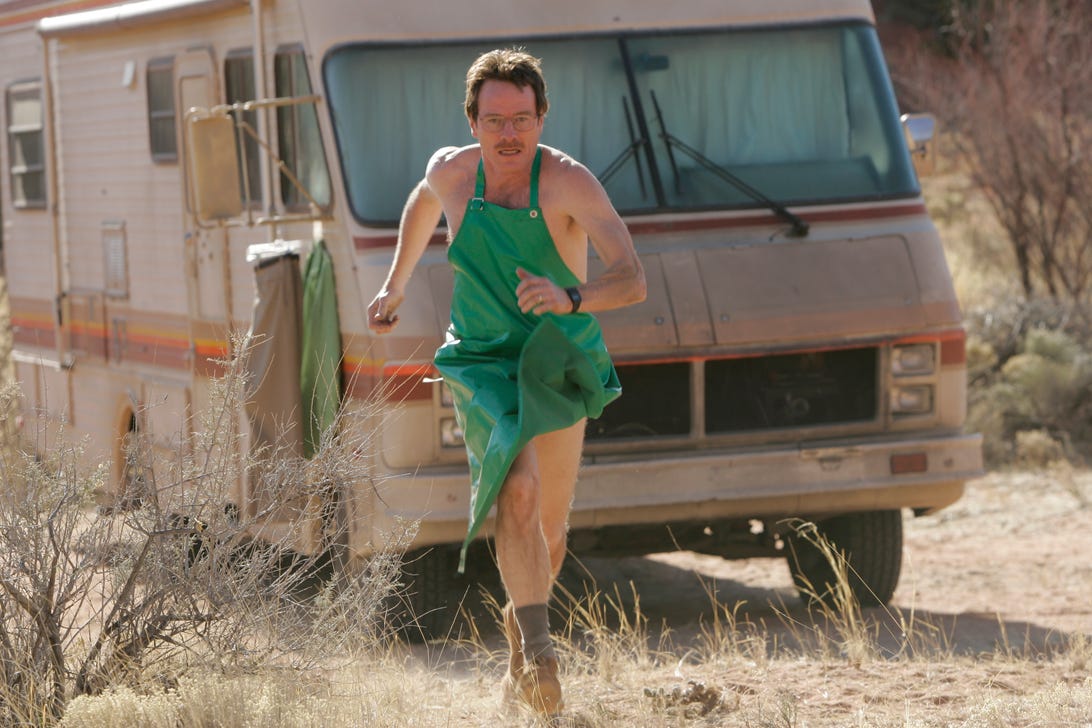
The RV presented its own set of problems.
Gilligan: I have a lot of memories of that RV. ... We bought it [from] a lovely older man and his wife... who had driven that particular RV all over America. It was like a member of the family to them... and they just wanted it to go to a good home. I don't think we misrepresented ourselves or anything. We said, "Well, it's actually going to be used on a television show." But we probably didn't say it was going to be used as a rolling meth lab. [Laughs]
Lyons: We built the [interior of the] RV on a stage. But we didn't have money to do it on hydraulics, so we just mounted it on big inner tubes. And the entire crew... got on one side or another to rock the RV, in order to have the bodies sloshing around.
Gilligan: On an early scout, before we started shooting the pilot, we brought it out [to the desert] just to see if we could fit it on the location that I wanted to use. Our stunt coordinator, Al Goto, drove it out there, and it got stuck.
Lyons: [Al's] a terrific driver, but it's a very hard thing to drive, and he got stuck in the sand and we all had to push it out. ... It was very embarrassing, because it was the first time we had met Al. He's a stunt driver, and he got stuck in the [sand]. [Laughs]
Gilligan: Al and I and the teamsters and the producers and the location person, we were all pushing on this thing, eight or 10 of us. We couldn't budge it. RVs are heavy. They are not meant to be pushed around by people. ... We had to wait there for hours, stuck there in the middle of nowhere until a big wrecker came along and pulled it out of the ditch.
Al Goto (stunt coordinator): We had to reinforce portions of the RV at different times to keep the integrity of the RV together, because it would have broken apart [otherwise].
Wolynetz: They broke the [RV]. That absolutely happened.
Goto: When it comes to a rest [at the end of the first scene of the pilot], it doesn't look like that hard of a stop, but my driver hit it hard enough where it popped the windshield out. That was a one and done.
Lyons: I said, "We only have one of these, Vince. So, when we crack it up, that's it. What about if we go to series? Are we going to use it?" And he said, "Absolutely not. Just destroy it." ... And then of course, six months later when we came back to do the series, Vince called me up and said, "Uh, we're gonna need the RV again." ... For all the rest of the time on the show, it never tracked straight ahead.
Cranston: Aaron and I both drove that RV on the highway while we were shooting. ... The steering column was just terrible, the amount of overcorrecting you would do. And it had so much play in the steering wheel that it was hard to get used to.
Gilligan: It was a good RV. And we did beat the living hell out of it.
Another, more serious, mishap that occurred in the desert was Vince Gilligan falling ill towards the end of the shoot. But that also ended up being a blessing in disguise of sorts -- one that resulted in one of the most classic shots of the whole series and the one that opens the episode: a pair of pants floating through the air against a backdrop of blue desert sky.
Gilligan: I came down with one of the worst flu bugs I've ever had in my life. I was just a mess. ... We were shooting out in To'hajiilee the day it really hit me, around Day 14 or so. It was probably 85 or 90 degrees out there, but I had a winter parka on and a knit cap, and I had a furniture blanket wrapped around me, and I was slumped in my director's chair just on autopilot. Everyone was sort of looking at each other saying, "Oh my god, is this guy going to die on us? What's going on?"
Cranston: He was in a down coat all wrapped up, and we were all in T-shirts.
Lyons: He was trying to soldier on, but... all of us had been saying to Vince, "Please go home."
Gilligan: We were shooting the scene where the fire truck comes in to put out the fire started by Walt and Jesse's misadventures with Krazy-8 and Emilio, and the fire truck was a real fire truck staffed by real, honest-to-god firefighters who also doubled as EMTs. I was sort of zoned out. I was waiting for the camera to get set up and all of a sudden, someone's got me by the wrist and is checking my pulse, and it's one of my extras.
Cranston: The EMT guy came over and looked at him and went, "You need to go home. You need to get home right now."
Gilligan: Basically, I might be the only director in history who ever got sent home by one of his extras.
Wolynetz: We had to stay in Albuquerque for three more days. ... [The shoot] was scheduled to be 14 days but it ended up being 17.
Gilligan: It dawned on me, "Oh crap. Am I going to be able to finish this thing?" We had to take an insurance day.
Wolynetz: While Vince was sick, John Toll just went out with a crew and just started shooting landscapes, shooting everything all over Albuquerque. And a lot of that footage continued to be used for years. ... That was all just John Toll kind of on his own, making beautiful pictures.
Gilligan: A couple of the shots from the teaser were actually directed and obtained by John Toll... because that shooting day had to go on. I basically talked to him on the phone from my hotel room where I was recuperating and I said, "Oh, try to get the pants flying or whatever" -- an iconic shot that I wasn't even there for because I was so ill.
Wolynetz: The single most difficult thing to do [while shooting the pilot] was to get that shot of the stupid pants done right. That was agony, in the middle of nowhere.
Lyons: All the shots of the RV wavering and driving off the road, and the pants flying through the air -- that kind of stuff takes tremendous time. So, we used the insurance day to enhance the show.
Detoro: Our special effects guy I had worked with before, so he and I had a good understanding of what to do with the pants to make them fly.
Lyons: When you're looking for experience, there is no one in the world who has experience of driving an RV and shooting dungarees into the sky in slow motion so that they fall at the same time the RV sweeps by. [Laughs]
Goto: That was done several times, because they wanted it to land in an exact spot, in an exact way.
Lyons: That level of precision and that level of vision is part of what started, I think, a drive toward quality television. ... It was, we're gonna get it right, rather than we're gonna get it done.
Detoro: They were Dockers. I'm sure I got them at J.C. Penney.
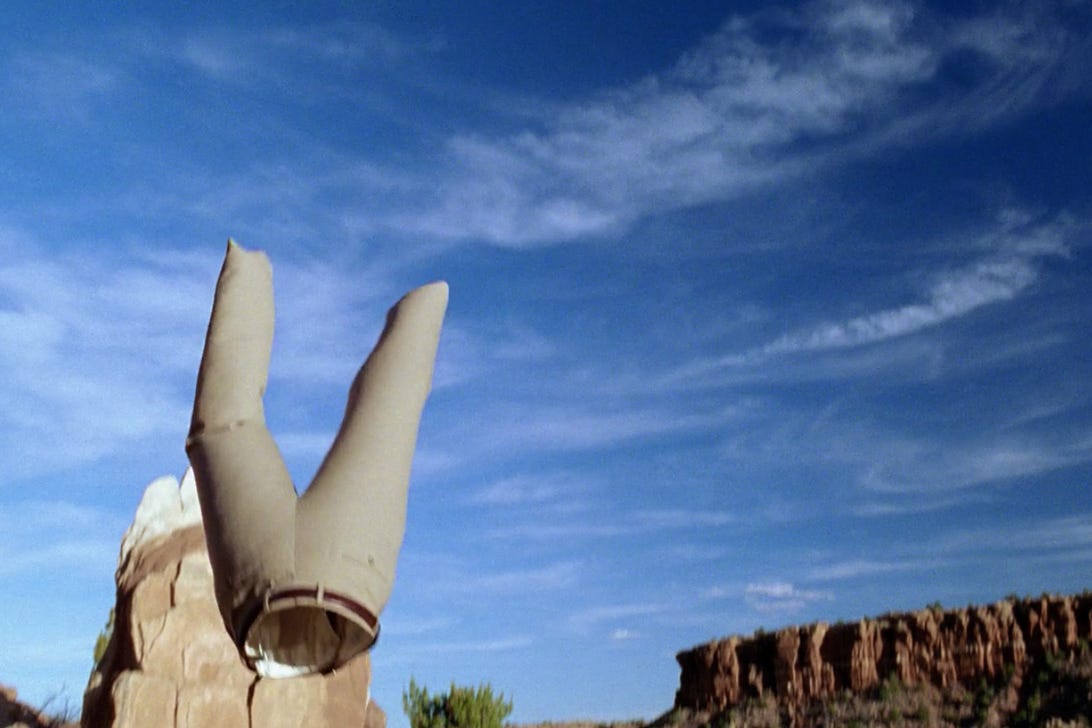
Shooting wrapped in the spring, and AMC worked with Gilligan to come up with a final cut of the pilot.
Moore: Somebody once said to me, "So what do you think, Karen?" I said, "I think I won the pilot lottery. I really do." ... Everything about it went right. Even when it went wrong, it went right.
Gilligan: Aside from getting really sick, it was just a wonderful shoot.
Norris: Then we sat around and waited for a few months to see if they'd pick it up.
Wayne: The [first] cut was amazing. We didn't change much in the cut at all. But [Vince] had put wall to wall music. And it was terrible.
Gilligan: Christina said, "What is with all the music?" And I said, "Well, that's what we do in television, Christina!"
Wayne: We were like, "Turn that f---ing music off!" ... And he was not happy about that.
Gilligan: I got a little on my high horse. I got a little offended... but then we stripped out the music, and lo and behold, she was right. ... [That was] the single best note any executive ever gave me on Breaking Bad.
Wayne: I think the fact that people can realize when they make a mistake is always great. And Vince and I from that moment on were super close and worked great together.
Wolynetz: We screened [the pilot] for [AMC bosses] Josh Sapan and Ed Carroll.
Collier: I remember so vividly, my boss, Ed Carroll, turning to me and saying, "We could add 20 minutes to this and it would be the best independent film of the year." From day one, that's how good the promise of Breaking Bad was.
Wolynetz: That's an absolutely true quote. We all went to a bar on University Place and we were celebrating, "Hey, we got our second series picked up!" And then Ed called Rob, and Rob just went ashen at the bar. He hung up and he looked at me and [said], "I was just told that they might not actually have the authority to approve the series."
At the time, AMC was owned by Cablevision, whose executives were reluctant to greenlight a second scripted drama. With the pilot shot and ready to go, and Mad Men debuting in July, AMC executives spent weeks in the summer of 2007 trying to convince their Cablevision bosses to take a second show to series.
Brandt: I remember just thinking, this has to go. Because I really just couldn't imagine not seeing that show through.
Wayne: We had this amazing pilot and we could not get anyone to greenlight it.
Wolynetz: Remember, they're a cable operator from Long Island. ... [They] were very nervous about that kind of expenditure and those kind of risks.
Collier: You're asking really smart people to part with tens of millions of dollars, prior to spending many millions more in marketing it... [And] you had to explain that you wanted to bet on a series where a chemistry teacher who almost won the Nobel Prize cooks meth with a former student ... It was very much placing bets that all look easy in the rearview, but were really big at the time, and not obvious.
Tom Rutledge (former COO, Cablevision): A terminally ill school teacher selling drugs isn't a typical all-American success story.
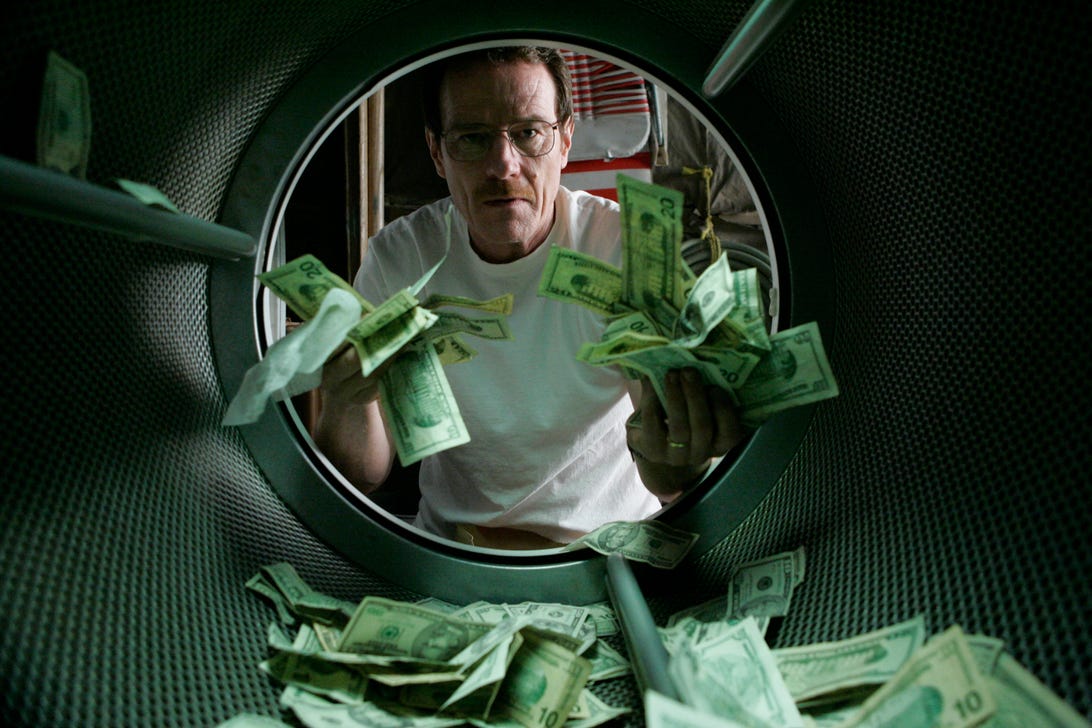
Wolynetz: What happens next is one of the weirdest things I've ever seen in 26 years of television.
Wayne: [We] had to go out to Bethpage, Long Island, which is where the Cablevision headquarters are, and hold a private screening for Tom Rutledge.
Wolynetz: It was Charlie, myself, Christina and Rob, and Tom Rutledge and his No. 2 and head of business affairs in the screening room. We run the thing and there isn't a single reaction from these guys. They don't laugh where you're supposed to laugh. They don't jump. Nothing. It was just nothing. And we're sitting behind them just dying.
Rutledge: I liked it from the beginning, but my recollection is that... the AMC team had some concerns it could be perceived as too edgy for basic cable.
Wayne: We had to get a yes because the deal, I think, was expiring. ... We had taken so many months to make this decision, and Vince was getting pissed. He honestly didn't believe we were ever going to make this as a series.
Gilligan: I really thought that the odds were very long indeed that the show would ever go on the air.
Wolynetz: It ends, and Rutledge turns around and says, "Well, that's a really excellent piece of work." And then he began to tell us all about the latest cable set-top box technology. ... We're going, "Yeah, that's great. That's terrific. What do you think of the show?" ... Then he's like, "Well, thank you all very much for showing it to me. I really enjoyed that." And he gets up and he leaves.
Wayne: [Charlie] and Rob didn't want Tom Rutledge to leave the building without giving an answer.
Wolynetz: We're all staring at each other, and Rob just blurts out like a kid in the fourth grade, "He can't go! We don't know what we're doing!" ... We run out into this giant atrium, and [Tom's] getting into a car. Rob and Charlie are like, "Where's he going?" And one of his assistants said, "Oh, he's heading straight to the helipad to fly into New York for another meeting." And Rob's like, "Let's go."
Wayne: Rob Sorcher got pulled over by the cops.
Wolynetz: They're literally chasing Tom Rutledge on the Long Island Expressway or whatever it was, and Rob gets pulled over. [Laughs]
Collier: Yes, on the way back from the screening, Rob Sorcher and I got pulled over. He was driving. I look back on that with great fondness.
Wolynetz: He's literally arguing with the cop, "I'm here with my boss. We're trying to get a show greenlit." And the cop let him off with a warning, and then he gets there in the nick of time. ... Charlie jumps out of the car like Adam West from Batman, and just jumps onto the helicopter. And what happened on that helicopter, I have no idea... but Charlie talked him into greenlighting the series.
Collier: I got the nickname "Chopper" because maybe a handful of times I might have gotten on some people's helicopters to make sure we had conversations that otherwise I probably wouldn't have had an audience for.
Rutledge: I remember joking around that if I liked it and [president of cable and communications] John Bickham liked it, it was probably OK for middle America. The programmers thought because John and I were from Texas and Pennsylvania respectively that we had some sense of cultural values in the country, which is of course ridiculous.
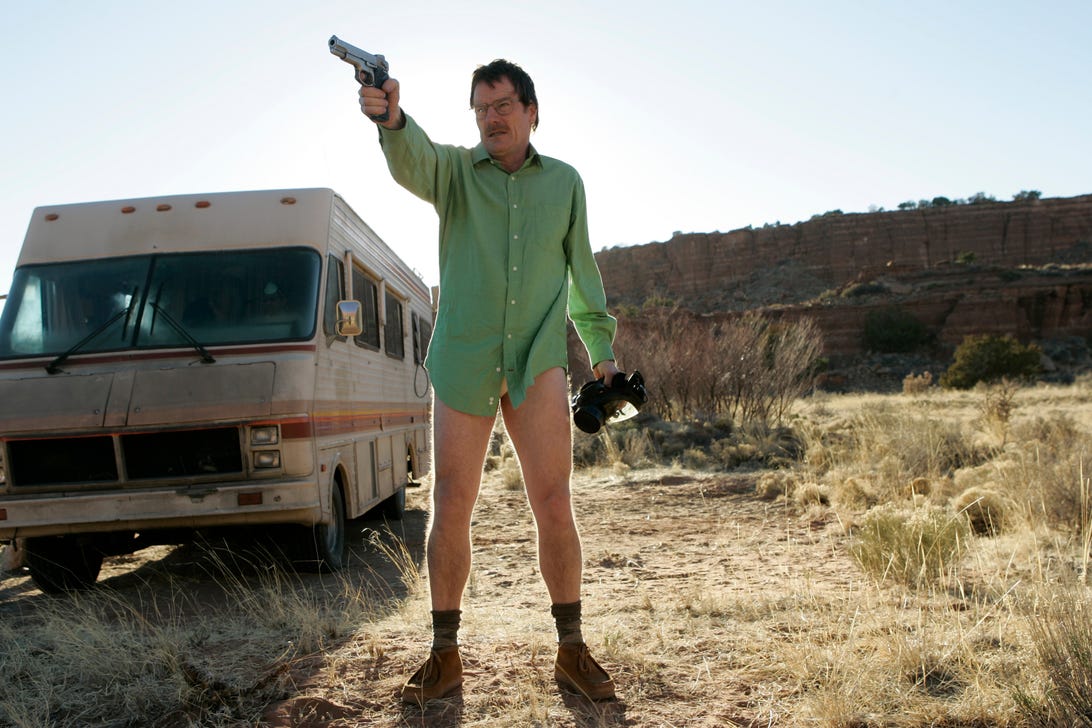
But still, few were convinced that the show would find an audience.
Gilligan: When it finally got ordered to go on the air, I thought, well, we'll get one season. All of us working together will make it the best damn season we know how to make, and then that'll be it.
Wayne: The main question at AMC was around marketing and PR because of the drug-selling aspect of it.
Collier: I remember countless conversations about how we would create the elevator pitch... trying to explain what the title meant, explain that this was actually a story about evolution and change and a person who, as Vince so famously said, is going to transform from Mr. Chips into Scarface, and say it in a way that your bosses, or an advertiser, or your partners would relish. ... It didn't seem possible in a story about a chemistry teacher who makes meth with his former student, all with a backdrop of a pilot episode cancer diagnosis.
Rutledge: We all had high hopes for our original content strategy and confidence in our company. I really liked Breaking Bad personally... We had to swing for the fences.
Goto: I thought it was really, extremely well done, but I don't think anybody could have ever guessed the success that that show would ever have on television.
You don't set out to make a classic.
Gilligan: This show never was intended to be for everybody. It never was and never will be kind of a four-quadrant taste, so to speak. It's a very acquired taste. It's like a strong blue cheese.
Cranston: It was just glorious in feeling the beginnings of something, the genesis of something. Everything was, of course, very new. New crew, new cast. New idea, new story, new character. And that kind of newness is titillating and exciting to play.
We had no idea at the time that this little story that we were creating in the high desert would become, years later, one of the most respected and loved series of all time. There was no way that any of us could have imagined that. ... You don't set out to make a classic of anything. Only fans can determine that and vote on what they think is the best series here and there. We can only try to do our best to tell the story and let it go.
The pilot episode of Breaking Bad, which premiered on Jan. 20, 2008, went on to win two Emmy Awards, for Lead Actor in a Drama (Cranston) and Drama Series Editing (Lynne Willingham). It was also nominated for cinematography (Toll) and directing (Gilligan). In addition, Gilligan won the Best Episodic Drama award from the Writers Guild of America for the episode.
Though it struggled in the ratings for the first two seasons, the critically acclaimed series took off with audiences in Season 3, in part thanks to its availability on Netflix. Overall, Breaking Bad went on to win 16 Primetime Emmy Awards, two Peabody Awards and two Golden Globes, as well as numerous other accolades and guild awards. It ran for five seasons and aired its series finale on Sept. 29, 2013.

